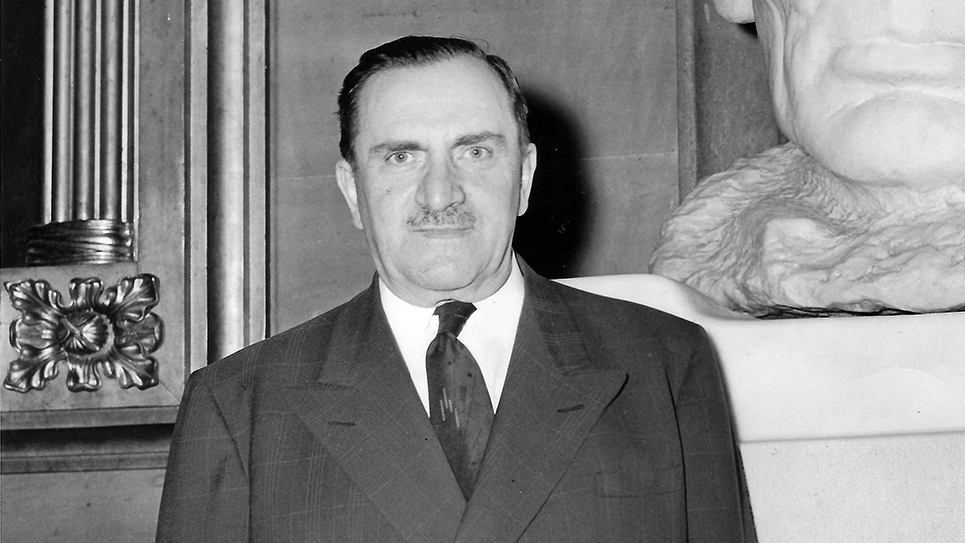By Ray Hill
This column is written for my friend John R. Mills. Johnny and I have been friends since 1976 and his was the first local campaign I worked on as a volunteer. Johnny’s wife, Charlotte, is a good friend of mine as well and so was her Dad, Mr. Hal Cate. The Cates were a mighty powerful political family in Knox County once upon a time. At least three members of the Cate family served as our sheriff; William T., Austin and J. Carroll Cate. Austin’s son, Richard, has long been a friend of mine as well. Recently, I came across a great photograph of J. Carroll Cate with Leslie Biffle, as they were the sergeant-at-arms for the 1944 Republican and Democratic National Conventions, respectively. Les Biffle was secretary of the United States Senate and something of an institution in Washington, D.C. J. Carroll Cate was influential in East Tennessee at a time when the GOP was a distinct underdog in Volunteer State politics. That photo illustrates this column.
John, Charlotte and I had lunch recently as I had sent them a copy of the photo of J. Carroll Cate. Johnny remembered some wonderful tales about the former sheriff, some of which I can repeat in a family newspaper. It was Carroll Cate who launched John’s political career. Much to the astonishment of John Mills, Carroll Cate abruptly announced one day he was going to run him for the Knox County Quarterly Court from South Knoxville. That was the equivalent of today’s county commission. The former sheriff declared he was putting his money where his mouth was, and slapped a $100 bill down on his desktop. That was the first contribution John Mills ever received for any campaign.
John and Charlotte helped the childless Carroll and Emilee Cate as they needed it. Carroll Cate and his first wife, Pauline Gammon, did have a child together; they had a son, named for his father, who had been born in 1925 and lived to be just a little more than three years old. I came along after Carroll had gone to his rest but I knew his widow, Miss Emilee, and she supported me in my own first campaign. I was thinking about it and thought Carroll Cate would be a mighty fine topic for a column about yet another colorful Knox Countian.
Carroll Cate was born on Christmas Day 1896 on a farm in the Thorn Grove community. In fact, originally his name was Christmas Cate, but he later changed it to Carroll.
Cate attended Carter High School and opened a “general merchandise store” when the First World War broke out. At age twenty, J. Carroll Cate was sent overseas where he served with the casualty and replacement detachment of Company M. Cate came home to Knox County in 1919 and got a job teaching at Thorn Grove School. His uncle, W. T. Cate, was the sheriff and Carroll later recalled, “I went to work at the jail as a general flunkey.” Carroll Cate was involved in an episode which was once quite famous but generally forgotten today save for historians. It occurred on a night in July of 1919 when a frenzied crowd of a thousand or more men battered in the side of the county jail in an attempt to lynch a Black occupant. The crowd was foiled by Sheriff W. T. Cate having already quietly taken the man to Chattanooga and safety. “That mob turned loose every white man in the jail,” Carroll Cate remembered during his own campaign for sheriff in 1936. “The prisoners included four men who had been sentenced to be electrocuted. I was the jailer that night. While I confess I wasn’t able to keep that mob from doing what it wanted to, I did refuse to give them the keys. What they got, they got by force, and there wasn’t anybody who could stop them either.”
1920 was a banner year for Republicans in Tennessee. It was also the first time women had the right to vote in all elections and the Volunteer State had been the key to ratifying the Nineteenth Amendment to the Constitution. The women folk helped turn out many of the Democrats who had not been for giving them the right to vote, including Governor A. H. Roberts. The Republicans elected Alf Taylor governor and won five seats in Congress, a record until 1972. The decade of the 1920s saw Republicans dominating the federal government; three GOP presidents occupied the White House and Republicans had majorities in both houses of Congress. The congressman from Tennessee’s Second District was J. Will Taylor, who also happened to be Republican National Committeeman for the Volunteer State. “Hillbilly Bill” Taylor had a big say in who got federal jobs. The other Republican congressmen from Tennessee – – – Carroll Reece, Joe Brown, Wynne F. Clouse, and Lon A. Scott – – – were all freshmen legislators. Carroll Cate went to work as the deputy administrator for the federal Prohibition Administration office where he remained until June 30, 1932, when Senator Kenneth McKellar’s good friend Henry R. “Peg” Bell took over.
“I was under civil service, so they couldn’t fire me without cause,” Carroll Cate said with a laugh. “So they accomplished the same thing by sending me a telegram notifying me that I was being ‘temporarily furloughed at the close of business June 30, 1932.’ Incidentally, that ‘furlough’ has never expired,” Cate added.
Carroll Cate remained at his farm for two years before he was plucked up by fate when the Republican-dominated highway commission in Knox County made him the superintendent of the “workhouse” which today would be the penal farm. There Cate remained until he resigned on April 28, 1936, when he announced his candidacy for the Republican nomination for sheriff of Knox County. Cate had been connected to law enforcement his entire adult life when he won the GOP nomination for Knox County Sheriff in 1936.
Cate won the nomination despite an investigation by the County Court into the activities of the highway commission. Some witnesses accused Cate of having employed more people than was necessary and noted the cost of food was greater than under the previous administration. Carroll Cate took the witness stand himself and quickly pointed out as superintendent, he did not have the power to hire or fire, so he wasn’t personally responsible for the number of employees. Cate readily confessed he had sought actual cooks to prepare the food instead of assigning the job to convicts, which had been the practice under the previous administration. Carroll Cate said the salaries paid the cooks were made up by “the economies they were able to make in the preparation of foods.”
“I have nothing to be sorry about in my management of the workhouse,” Carroll Cate told a newspaperman in 1936. Indeed, it had been Carroll Cate who had abolished the much whispered about “whipping post,” an utterly ugly practice said to be utilized at the workhouse. “Although a person is unfortunate in doing something to be sent to the workhouse to serve his sentence to society, he still is a human being,” Carroll Cate said.
Knox Countians trekked to the polls without Early Voting and other conveniences to cast a record number of ballots in the August county election. J. Carroll Cate led the ticket and handily defeated two opponents; Democrat J. D. “Val” Crippen and Independent candidate Ben Thompson. Cate led his nearest rival by more than 5,000 votes, winning 68 of the 81 boxes. The GOP ticket had been managed by Jack Dance, deputy county clerk and a future mayor of Knoxville. When asked for a statement on the Republican ticket’s victory, Dance replied, “I can’t say anything. I haven’t had any sleep since Tuesday, and I’m going to bed. But it was a great race and a great victory.”
Carroll Cate’s own telephone was disconnected as his first wife, Pauline, was seriously ill.
At the time, Knox County sheriffs were elected for two-year terms. When Carroll Cate was up for reelection in 1938, Leslie T. Hart, writing for the Knoxville Journal (and he became the widely read political columnist for the Nashville Banner in the future) declared J. Carroll Cate had been slowed down by the illness of his wife and hampered by ouster suits, yet “had been the leader of the greatest criminal law enforcement program Knox County has witnessed in years.” Cate’s wife Pauline died during his first term as sheriff and had himself suffered from a painful leg injury suffered earlier while working as a prohibition agent. Cate was in the pink of good health after having his leg tended to in a hospital.
According to Hart, “Sheriff Cate and his deputies have solved all major crimes brought to his attention” and had “poured out thousands of gallons” of illegal whiskey. Hart pointed out no candidate for Knox County Sheriff had been elected to office by such an overwhelming vote as had been Carroll Cate. Hart also noted Sheriff Cate had significantly reduced “fee grabbing” by deputies. As Cate ran for reelection, Leslie Hart credited the sheriff for having improved the food served to prisoners and treating them like people. Nor was Cate lax on enforcing the law, having made 20,000 arrests during his first two years in office. Cate had also eliminated what was bitterly referred to as the “kangaroo court” which operated at the county jail prior to his administration. Cate did have his own political detractors and enemies, the most persistent being L. C. Ely, a Knoxville attorney who had tried to have the sheriff removed from office twice. Cate was reelected easily over challenger Barney T. Giddens.
Cate was succeeded as sheriff by Hazen Kreis, a grandson of a former sheriff, who stood six feet, five inches and weighed 365 pounds. Carroll Cate became the chief deputy to newly-elected Property Tax Assessor Rufus P. Harvey, who had been a Market Street merchant before his election.
Carroll Cate’s appointment as sergeant-at-arms for the 1944 Republican National Convention that nominated New York Governor Thomas E. Dewey came about through the influence of Congressman Carroll Reece. While Reece was the congressman for upper East Tennessee and Cate lived in the district of John Jennings Jr., Reece was also Tennessee’s Republican National Committeeman. Carroll Reece wielded considerable influence with many members of the National Committee and Cate was the first Tennessean ever to serve in the post. It was a post with some real responsibilities, having charge of the doors to the main convention hall, and the floor of the main auditorium, and the galleries. Cate’s predecessor during the 1940 GOP convention had reputedly helped to pack the galleries which had constantly yelled for the nomination of Wendell Willkie. A special press report made its way from Chicago, site of the Republican National Convention, back to Knoxville where a reporter wrote Carroll Cate’s appointment “indicates Tennessee is receiving more recognition than formerly in high circles in the party.”
Tax Assessor Rufus Harvey had been absent for some time from his office, ill with a heart ailment, leave Cate with the responsibility to keep things running smoothly. Thought to be improving, Harvey announced he was resigning. Thomas W. Brown, chairman of the Knox County Equalization Board, announced he would seek the appointment to serve as tax assessor. Brown was outmaneuvered at every turn by the wily Carroll Cate. Eventually, Brown was told Assessor Harvey would not resign until he was certain enough members of the County Court would vote for J. Carroll Cate. Brown quit the race. Cate was promptly appointed.
Carroll Cate remained active in Knox County politics long after he had left office. Cate assumed his status as an elder statesman and knew where many of the bodies were buried – – – he had buried some of them himself. Carroll Cate quietly passed on December 28, 1980, three days after his eighty-fourth birthday.






